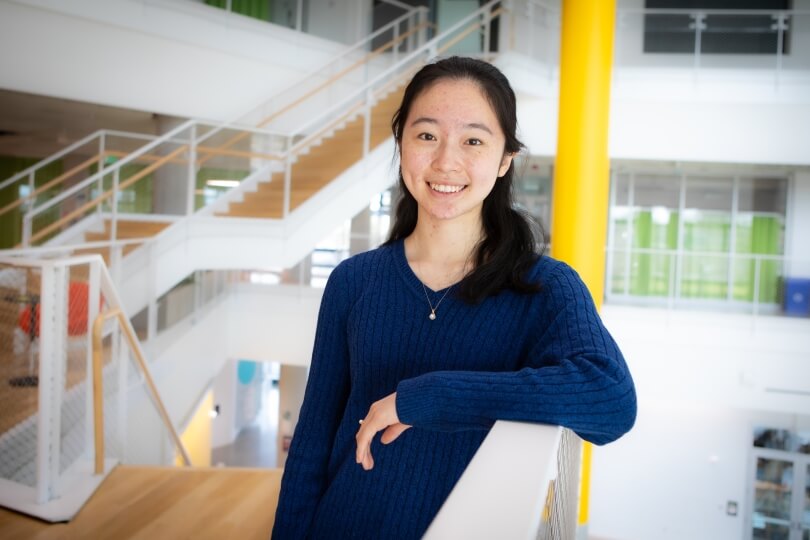Lauren Chen, A.B./S.M. '24, in mathematics and statistics/computer science (Eliza Grinnell)
Lauren Chen looked around the room of a national middle-school math competition, and something was immediately clear: despite the competition drawing from every U.S. state, there weren’t a lot of people who looked like her.
“Out of all 224 students there, there were only 27 girls,” said Chen, A.B./S.M. ‘24. “I remember seeing that number for the first time in seventh grade, and I was shocked at how imbalanced it was. Ever since, I’ve been involved in advocacy.”
Chen, who’s concentrating in mathematics and statistics with a concurrent master’s in computer science at the Harvard John A. Paulson School of Engineering and Applied Sciences (SEAS), has pursued that advocacy throughout her time at Harvard. She got involved with the SEAS-affiliated Women in Computer Science (WiCS) student organization, and this year became a SEAS Office of Diversity, Inclusion, and Belonging (DIB) Fellow. Her main project as a DIB Fellow has been to establish a new mentorship program that pairs undergraduate and graduate students at SEAS.
“I wanted to focus on mentorship because that was really important to me in my first two years at Harvard,” she said. “The WiCS mentorship program let me talk to upperclassmen about what I wanted to do with my summers, my classes, my concentration, and life in general. I wanted to create some kind of mentorship program in a space that was lacking it, which is between graduates and undergraduates who are interested in doing research but don’t know how to start.”
Though only in its first semester, the mentorship program has already brought together 50 undergraduate-graduate student pairs. The goal is to continue growing the program even after Chen graduates.
“We definitely try to match based on interests – not only what academic fields they want to do research in and which labs the grad students are part of, but also their interests in specific parts of the research process,” Chen said. “Some students have never done research before and are most interested in learning about how to reach out to labs and get involved, while others might have a specific project in mind but are curious about what it’s like to be a grad student.”
Growing up in South Carolina, Chen was drawn to science and mathematics at a young age, participating in numerous science fairs and math competitions. When it came time to pick a college, Chen wanted to go outside her comfort zone and travelled almost 1,000 miles north to Harvard.
“I was actually in Cambridge the summer before my senior year, and I really liked the city and its proximity to Boston,” she said. “After learning more about Harvard, I was even more interested in it. Once I started hearing more about Harvard’s clubs, I was really involved in a lot of extracurriculars during my time in high school, and I wanted to continue that. I really liked how many clubs and opportunities Harvard had to get involved in on campus.”
Once she arrived here, Chen joined as many of those clubs as she could, frequently taking on leadership positions. While some reflected her past interests, such as WiCS, the Harvard Undergraduate Mathematics Association and Asian-American Dance Troupe, several reflected a new interest: finance. Chen has served as director of technology for Harvard Undergraduate Quantitative Traders, and sourcing principal for Harvard Undergraduate Capital Partners.
“I didn't really know what finance was before coming here,” Chen said. “I always knew that I wanted to do something quantitative, especially given my interests in math competitions. My interest in more of the applied side of quantitative fields such as finance started once I got to college. All of the clubs I joined were ways to explore different fields and career paths, because I didn't really know anything before coming here.”
Chen explored those career paths through internships at Belvedere Trading and Morgan Stanley.
“What I really liked about that is it felt like school without going to school,” she said. “The trading internships had a very big education component. We took classes which were very mathematical in nature, and outside of class we’d do interactive workshops. I felt like I was learning something new all the time, which is what drew me to the field.”
Chen chose the A.B./S.M. program because computer science (CS) offered practical applications for the theoretical framework she learned in her math and statistics classes. Her summer internships in turn drew on all three academic disciplines.
“These three fields are super related, but still different,” Chen said. “I took a lot of theoretical computer science classes, so it was a little like math, but with more of a focus on algorithms with real-world applications. I took one class that focused on algorithmic approaches to concepts like rent division, budget allocation, committee election – things I didn’t see in my other classes but were things CS could be used for to solve problems in the real world.”
Those summer internships should also set up Chen post-Commencement. She plans to return to New York to pursue a career in quantitative finance.
“Everything I’ve learned at Harvard builds towards this professional goal,” she said. “The critical thinking I’ve learned from taking all these courses has really helped me in my internships and professional life.”
Press Contact
Matt Goisman | mgoisman@g.harvard.edu
